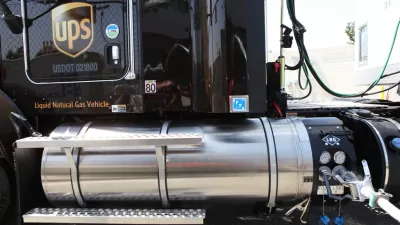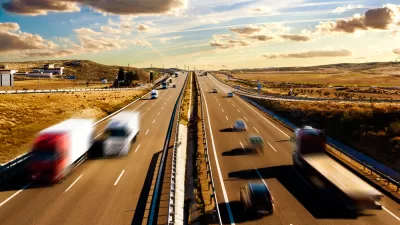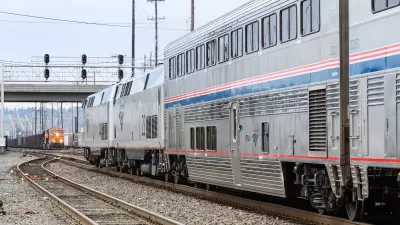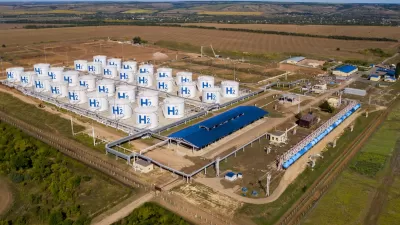Just as the power industry turned toward lower priced natural gas and away from dirtier coal, there are signs that trucks and trains are looking to lower priced liquefied natural gas (LNG) to replace diesel-powered vehicles, but there are challenges.

Diane Cardwell and Clifford Krauss report that United Parcel Service will expand the number of their long-haul, 18-wheelers that are powered with LNG from 112 to 800, making it the "(m)ost extensive private LNG fleet in U.S. by end of 2014" according to their fact sheet. The benefits are substantial - to the company, the country, and the environment.
It is cheaper, saving truckers as much as $1.50 a gallon, and it burns cleaner, making it easier to meet emissions standards. The move could also cut the country’s oil import bill. The domestic fuel also provides some insulation from the volatile geopolitics that can drive up petroleum prices.
The two main challenges are overcoming the higher price for the vehicles - up to twice as much as a diesel-powered truck, and the shortage of refueling stations - a problem that most alternative-fuel vehicles face. UPS is up to the challenge though.
Transport Topics reports that UPS will "build four refueling stations by the end of next year."
LNG will be a viable alternative transportation fuel for UPS in the next decade as a bridge between traditional fossil fuels and emerging renewable alternative fuels and technologies that are not quite ready for broad-based long-term commercial deployment,” Chairman and CEO Scott Davis said.
The long-haul LNG trucks should not be confused with UPS's growing fleet of over 1,000 compressed natural gas (CNG) trucks that is uses for local deliveries.
Natural gas has a long ways to go before it dents diesel's near monopoly hold on freight transportation fuel, according to Cardwell and Krauss.
Vehicle use of natural gas in the United States is still negligible but it has been growing. Among fleets whose vehicles travel shorter routes, like transit buses, refuse haulers and delivery trucks, use of compressed natural gas is much further along. Last year, more than half of newly purchased garbage trucks ran on compressed natural gas.
Nathan Vakerklippe of The Globe and Mail reports on efforts to replace diesel with LNG in Canada - but not just for trucks - for trains and ferries too.
Canadian National Railway Co. is running tests with two LNG-powered locomotives and British Columbia Ferry Services Inc. is seriously considering installing LNG engines in new vessels.
Biggest challenge: refueling infrastructure. “Ultimately (LNG) can displace 100 per cent (of diesel),” said Dick Brown, chief executive officer of Ferus LNG Inc. “What it needs is the infrastructure to be able to do that.”
Russell Gold writes in The Wall Street Journal that "BNSF Railway Co., one of the biggest U.S. consumers of diesel fuel, plans this year to test using natural gas to power its locomotives instead."
If successful, the experiment could weaken oil's dominance as a transportation fuel and provide a new outlet for the glut of cheap natural gas in North America.
Correspondent's note: Link to WSJ article should allow access for non-subscribers through May 5.
FULL STORY: Trucking Industry Is Set to Expand Its Use of Natural Gas

Planetizen Federal Action Tracker
A weekly monitor of how Trump’s orders and actions are impacting planners and planning in America.

Maui's Vacation Rental Debate Turns Ugly
Verbal attacks, misinformation campaigns and fistfights plague a high-stakes debate to convert thousands of vacation rentals into long-term housing.

Restaurant Patios Were a Pandemic Win — Why Were They so Hard to Keep?
Social distancing requirements and changes in travel patterns prompted cities to pilot new uses for street and sidewalk space. Then it got complicated.

In California Battle of Housing vs. Environment, Housing Just Won
A new state law significantly limits the power of CEQA, an environmental review law that served as a powerful tool for blocking new development.

Boulder Eliminates Parking Minimums Citywide
Officials estimate the cost of building a single underground parking space at up to $100,000.

Orange County, Florida Adopts Largest US “Sprawl Repair” Code
The ‘Orange Code’ seeks to rectify decades of sprawl-inducing, car-oriented development.
Urban Design for Planners 1: Software Tools
This six-course series explores essential urban design concepts using open source software and equips planners with the tools they need to participate fully in the urban design process.
Planning for Universal Design
Learn the tools for implementing Universal Design in planning regulations.
Heyer Gruel & Associates PA
JM Goldson LLC
Custer County Colorado
City of Camden Redevelopment Agency
City of Astoria
Transportation Research & Education Center (TREC) at Portland State University
Jefferson Parish Government
Camden Redevelopment Agency
City of Claremont





























